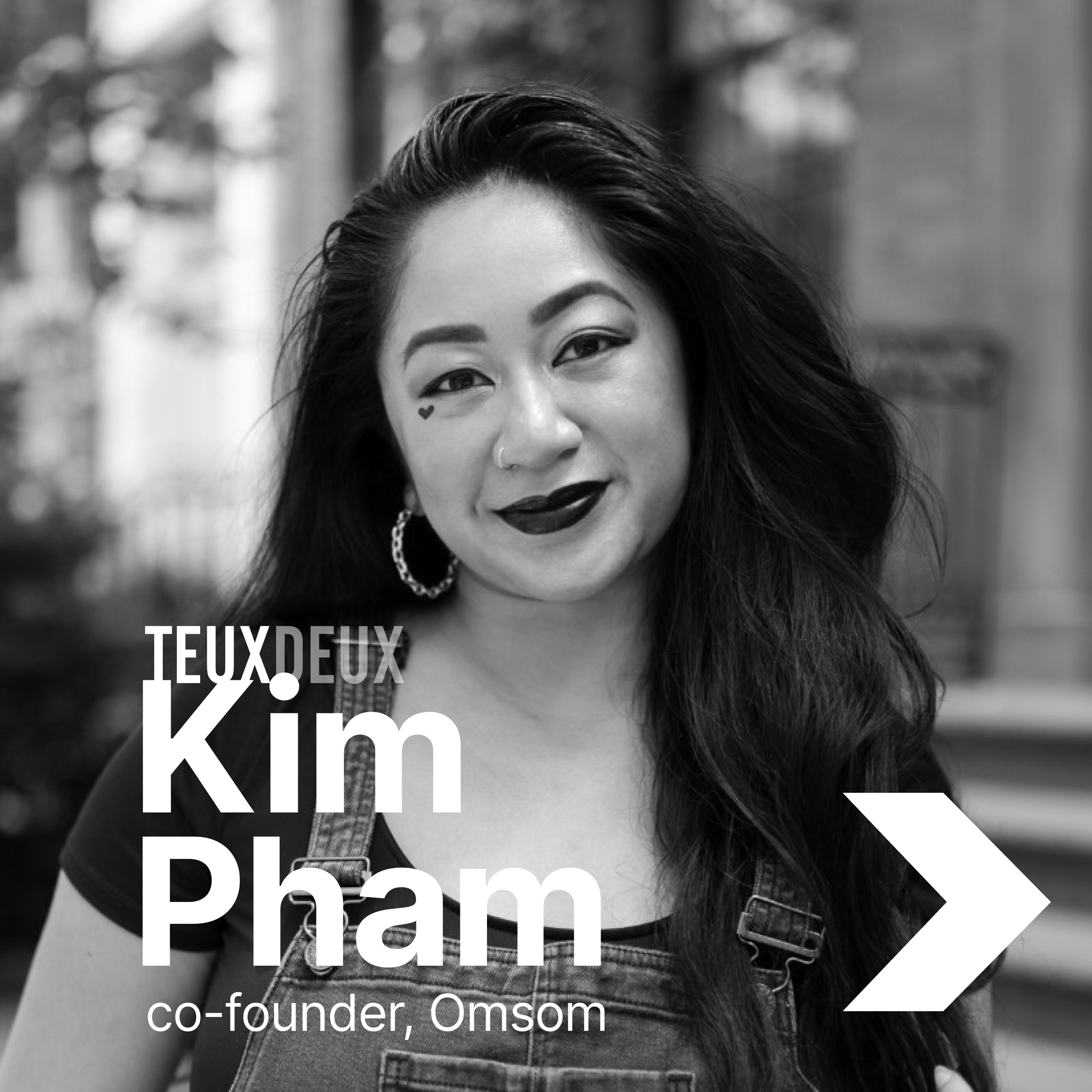We sat down with Kim Pham, co-founder of Omsom, a proud, loud, Asian food brand partnering with chefs to make Asian cuisine and flavors more accessible at home. The company launched in 2020 and has seen incredible success online with their line of direct-to-consumer recipe starters and pantry staples. Kim tells us about starting the business with her sister, how Omsom’s values have guided its growth and how they show up in her own life.
Listen to the episode or check out some interview highlights below:
Omsom has been featured in Bon Appétit, Food & Wine, CNN, Forbes, if by some chance a listener has not heard of it yet. Can you tell us a little bit about the company and what you do there?
So, Omsom is a proud loud Asian food brand. We partner with incredible Asian American chefs all throughout the nation. To craft, essentially, pantry staples that make it super easy for you to cook restaurant quality Asian dishes in under 20 minutes. So literally you just take one of our little packets, you rip, pour, and you fire it up with any fave kind of protein or veggies that you might have access to.
It's run by myself and my sister, Vanessa. We are both first-gen Vietnamese Americans and daughters of refugees, and the company was really born from our lived experiences as third culture kids. We really just wanted to build the kind of rowdy, in-your-face brand, that would be a middle finger to all of the tropes that flatten, silence, and erase Asian Americans. At Omsom, I handle all things brand, creative, content, communities. All the right brain stuff, basically.
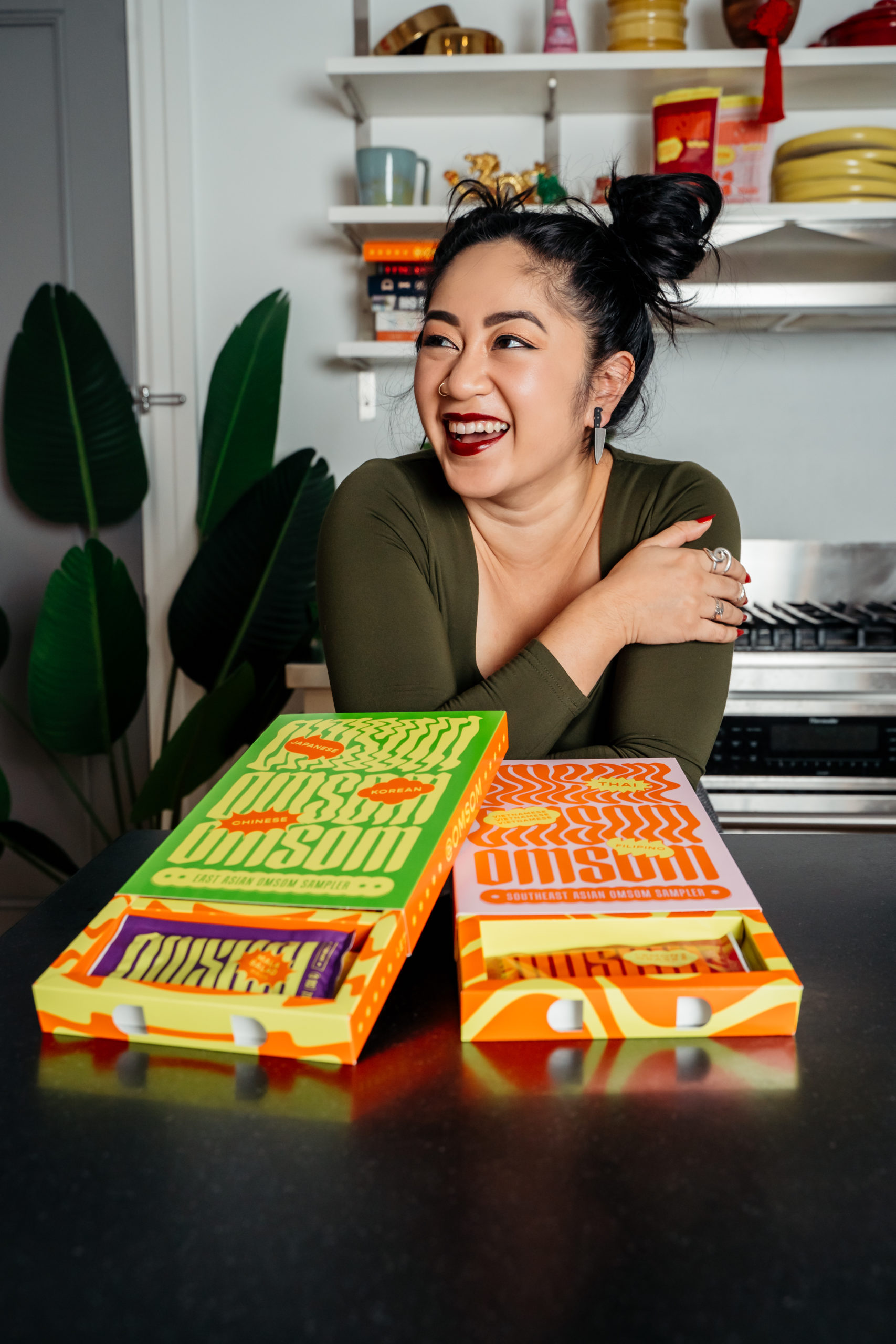
On your website, you refer to yourself as an ex-Warped tour kid who found community on Xanga and Tumblr. You're speaking my language, what were some of your early formative experiences being a "human of the internet?"
Yeah, little bit of background here. So I'm the daughter of Vietnamese refugees. I'm also the oldest of two. I'm also the first in my family to go through the American school system. So, I really felt different in many ways. We also grew up in a town that was 98% White, just south of Boston and so I never really fit in. I was an alt kid. I didn't know at the time, but I was queer. I just didn't find belonging in real life and so the internet was my escape.
My father is a software engineer, so I got access to the internet, untethered access to the internet, at a very young age and realized, oh, my people are like Reddit weirdos. They are people writing long form essays on LiveJournal. They're other scene, emo kids on Tumblr. Was it always the healthiest thing for like a 10, 12 year old kid to have access to? Maybe not, but it really gave me my love for the internet and my love for subculture and sub communities. I hold that internet weirdo thing really close to my chest because I feel like so much of my creativity and my experiences have come from just seeing internet stuff.
I want to read you this tweet from November 4th, 2021. You tweeted, "Another year of TeuxDeux being the longest relationship. In my life who needs partners when you can have software subscriptions amirite 🖤." As a founder, I imagine you have a never ending list of responsibilities and things you have to get done. How do you organize and prioritize your day and the things you need to do for the business? And what else is in your day-to-day web tool belt?
Yeah. First off love y'all. I found y'all, I think, when I was in college. I don't even remember how, but I just wanted something super simple that I didn't have to think about. I'm not a structured person, I'm not a structured thinker. I'm definitely a creative's creative, and so these hyper-built-out tools were just not helpful to me. I didn't need all the timers and all the things and the colors. I was like, I literally just want a to-do list. And so I stan. Not product placement. I'm just, I'm obsessed.
My day? How do I structure my days? I mean, I'm really grateful that I get to work on the creative side of Omsom. So much of what I do is constantly brand thinking, content thinking, storyboarding, writing scripts, things like that. So my toolkit is pretty straightforward: Asana for project management, I use my inbox and TeuxDeux pretty much as my to-do list. Slack, Notion for more robust scripting out or storyboarding.
We have templates that we've built out on Google drive, it's pretty straightforward. We're a very lean and scrappy team. It's literally just me, one content associate, and a couple interns that do everything on the creative and content side. So, because we're such a small operation, we're allowed to hack tools for our little team. But it works. And I think some of the magic is because we're not making everything efficient and scalable to death.
There's a quote like, "there's no silver bullet to brand and creative and content." You have to do it somewhat manually to capture some of the magic in the early days. So yeah, that's our little hacky set up.
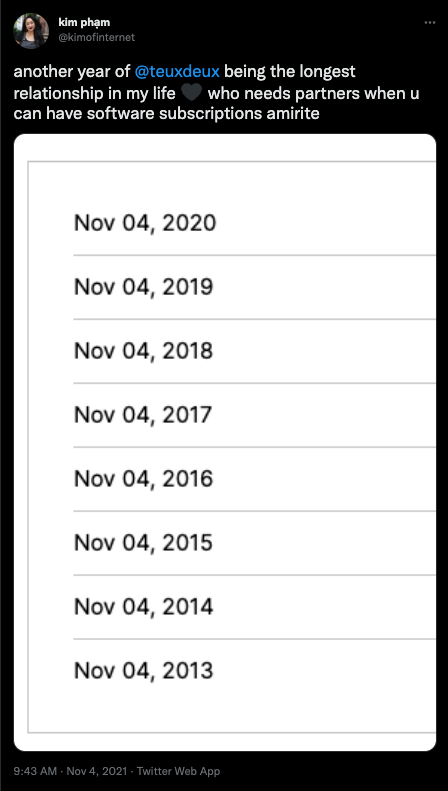
I think food is often how first or second gen kids, third culture kids, begin to reckon with, or reconcile, their relationship with their culture and heritage as adults. What was your relationship with Vietnamese culture and food growing up and has it changed over the years?
I think my relationship with food growing up, in the beginning, it was so riddled with other shit. My parents both worked full time jobs. Vanessa and I would come home from school. We would do homework at the counter, and then my mom would get home from work and literally cook a three course Vietnamese meal. And then my dad would come home from work and it did not matter how late we finished homework or how late my parents got home, it was really important to my parents that we all had dinner together every night. No sitting in front of TV, or half the family eating, it was really important to them.
I remember just thinking oh my gosh, this is so tedious. Why can't we be like "normal" families. My friends are allowed to eat in front of the TV or they're allowed to grab the dinner and go, and also, why do we have to eat this type of food? I remember feeling deep and immense shame around the fact that sometimes my house smelled like fish sauce, or I remember my parents would boil pork. And I'm like, oh my gosh, my White-American friends don't eat this much fat. And there was so much wrapped up in my relationship with food and Vietnamese food in particular, because it was coupled with my shame of being different and of being other and being a daughter of refugees and the way that my family grew up.
And so I think for a long time, I mean, I love Vietnamese food and I always have loved Vietnamese food, but I definitely think my public or external facing relationship with it was quite fraught and it wasn't until I left for university, I left home at 17 and came to New York City where I went to NYU, that I just began missing my mom's food so much. Dorm food sucks and yes, you're in New York City, but I was a student so I couldn't afford to eat out. And yes, there's a very big Asian population at NYU, but most of that population's east Asian or south Asian. There were very few Southeast Asian students that I went to school with and that's when I started to realize not only do I miss this food, I miss the language, the small cultural things that I had totally taken for granted.
I think that was a real turning point to like, Okay, wow. Food is actually, like you said, the first step that I turn to when I want to reengage with my identity. When someone's like, what does it mean for you to be Vietnamese? I'm like, let's go get Vietnamese food and let's dig into it. That feels like, oftentimes, the easiest way to begin to step back into that place.
I hold that internet weirdo thing really close to my chest because I feel like so much of my creativity and my experiences have come from just seeing internet stuff.
One thing I really admire about Omsom is that you all have used the platform that you have to lead conversations around how we talk and think about cultural cuisine, whether it be the "ethnic" aisle in the grocery store, the phrase or term "authenticity" when we're referring to cultural restaurants and food. How much reflection did that take between you and your sister as you were coming up with the idea for Omsom?
I get asked this occasionally and I never fully know how to answer it. I think a lot of other founders might feel the same way, people see the end result and think oh, this is a strategic, smart business decision, Kim. It's allowed Omsom to insert itself into conversations that maybe it wouldn't normally, or given you cultural resonance in a new way or wow, how relevant, right? A lot of these conversations are happening in a national dialogue.
For me it's such an organic, natural extension of Vanessa and I as individuals. We weren't like, let's talk about "authenticity" and MSG and the ethnic aisle because that's a hot topic and people are gonna wanna share that. It's literally like, hey. These are the things that we care about as individuals, and we've gone a lifetime now of people not caring about these things or saying that we are overreacting or that these things aren't important to think about.
But now thankfully, for some reason, Omsom and Vanessa and I and our team have been given this incredible platform. Of course we would talk about these things! And so it feels very much like every single word that you see on our website, in our content, largely comes from me. I still do most of the copywriting at Omsom and we talk about things because it's what we care about.
Yes, it's like business decisions and brand building and hashtag capitalism. Everything is, you know, in service of building this brand. But really, when I think about those issues that you're talking about, the tropes that we try and deconstruct, the stereotypes that we try and tear down, the education that we try and do around Asian American, not just food, but also culture and identity. All of that is because Vanessa and I feel very strongly about third culture, Asian American identity. We're in this really interesting time in society where I think our parents', or maybe our grandparents' generation, was really keen on being identified as Chinese or Japanese or Vietnamese.
And now we're moving to this next iteration of Asian American identity where "Asian American" actually means something. That phrase was also born from solidarity with Black American communities and if the very root of the name is equity and justice, then we have to honor that through what we do at Omsom. So it feels like both a burden and a privilege in many ways. And I'm really grateful. I'm really grateful for it. It's the coolest thing to get to work on as a creative and as someone who has cared about social justice for a very long time.
The company launched in 2020, you and Vanessa had both quit your jobs to work on it full time. Did you have any sort of mental checklist of what needed to be right with the business idea before you allowed yourself to lean fully into it? Or were you ready to pursue the opportunity?
Oh, this is such a messy period. I wish there was a super clean, sexy story. I've been working in startups my whole life. I love taking companies from zero to one. I live and breathe risk. So I was ready since the beginning. I think Vanessa, being the left brain, Harvard alumna, ex-Bain consultant, needed a bit more time and comfort.
We started working on it nights and weekends. I had left a job in venture and was consulting and being nomadic, and she was on year two of management consulting and she was like, I wanna die. This is so bad. And frankly, after the 2016 election, her and I both felt personal, moral emergencies to make the world a better place, even if just in a small way, in our lane.
Looking back, I don't even know what we were doing for six months. We were just literally throwing shit at a wall to see what stuck, because like you said, Omsom wasn't a business that was like, Ooh, these trends are going to intersect here and there's white space and we could be the first-mover. It was none of that. It was literally just what are all the things that we care about. From those passions, what could potentially be interesting? And so we broadly landed on Asian food, Asian culture.
We started doing tons of consumer research and surveys. By tons, I mean, Vanessa and I sending out Typeforms into Facebook groups. I think we got over 500 survey answers. Of those 500, we actually got on the phone with a hundred of them and were like, talk to me about how you interact with Asian food. How often do you eat it? Do you order it online? Do you go to the restaurants, takeout? What kind of Asian food? Had no idea what we were looking for. It was literally just, let's just collect input.
From those hundred phone calls, we actually went into the homes of 50 people. Many of whom are still Omsom fans to this day, which is so cool. But we were just like, can you cook us Asian food and let us just watch? We literally would take notes and through all of that really messy, frankly, customer research, we realized a couple things, which now that I say it out loud, you're gonna be like, no shit, Kim. You didn't need a whole summer of doing this, but you know, you have to take the scenic route. The things that we learned were that one, doesn't matter if you're Asian or you're not Asian, but surprise surprise, everyone loves Asian food. People eat it regularly but face a lot of barriers when it comes to cooking Asian food in their home.
So if you're Asian, it's look, I love these flavors, I grew up on them but I don't live close to Chinatown or my "ethnic" supermarket, or my mom's recipes just are not helpful. I just don't do it cuz it's not gonna be as good. And then for non-Asian folks, it's I literally don't know the difference between dark soy sauce, light soy sauce, sweet soy sauce. I have no idea how to begin to get ingredients, and then when I do get them, I use a tablespoon and it sits in the back of my fridge for months until I throw it away. And so from there, Vanessa and I were like, okay, this is really interesting. More people would eat Asian food, but we just need to lower the barrier.
So that's the starting nuggets of how Omsom came to life. But yeah, in the beginning there was no, All right, we need to have this beta fully proven out and then we're gonna...it was so intuitive. At one point, her and I were just like, I think we're onto something.
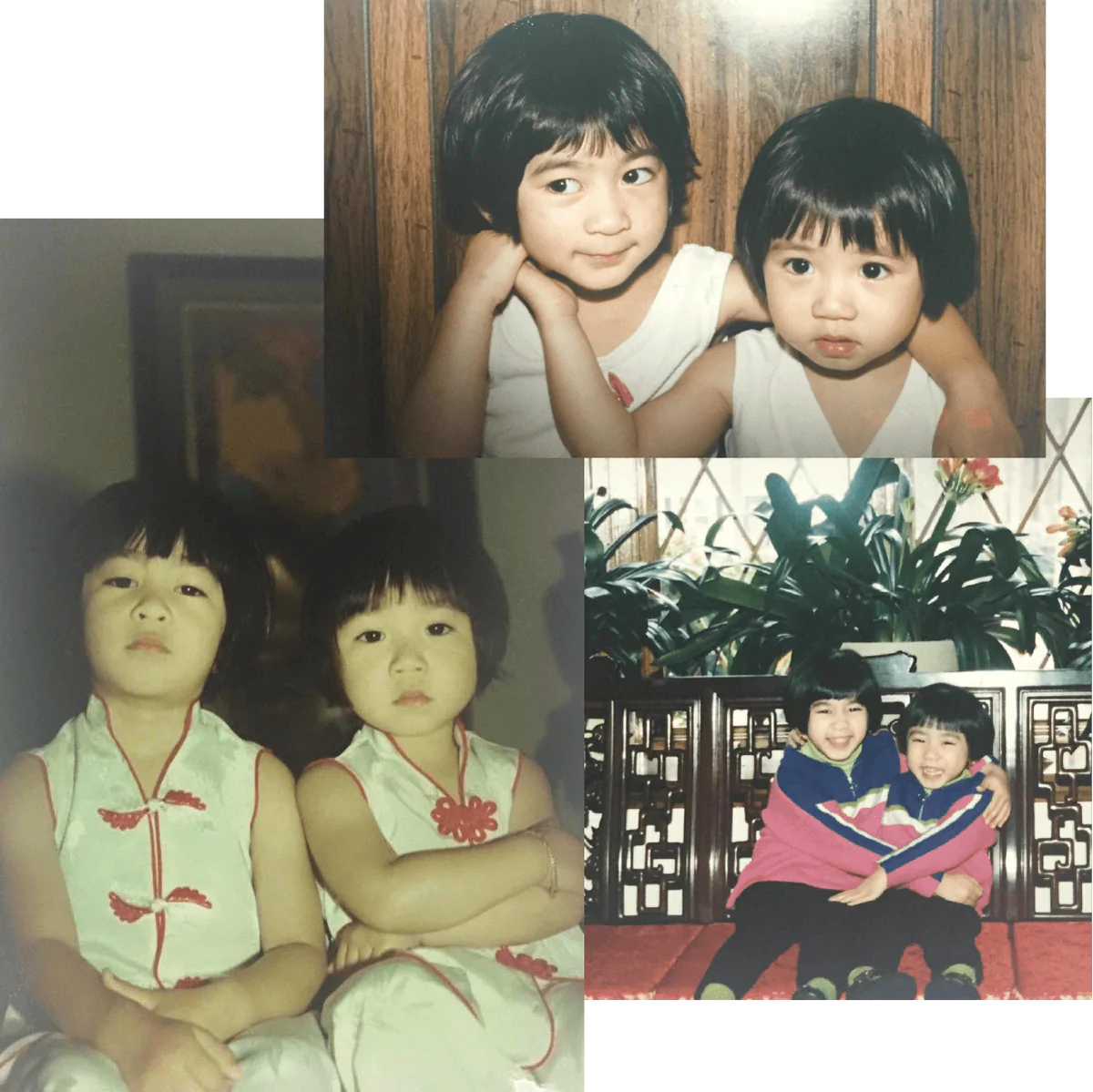
You started this whole video series, URL to IRL, to tell the story of launching at Whole Foods and all the business decisions that went into it. Why is that sort of transparency, so important to Omsom?
Yeah first off, like rising tides raise all boats. I have accepted in my heart that if Omsom dies tomorrow, I'll be okay with it because I am so proud of the work that we've done. We've already achieved everything I could possibly want. Therefore, I think it's my job as well to lift others as we climb up. But there was a very real conversation when I showed Vanessa some of the early scripts.
As the children of immigrants, scarcity is very hard to unlearn and she was like, do we really want to share these insights? We paid a lot of money to run these focus groups and now we're giving it out here for free that putting your photo on your packaging makes a big difference. You can just expect now every brand in that aisle is going to have their founder photos on it.
And there was a moment where we were like should we keep that, and we made the decision to not to because we're like, okay, pull ourselves all the way out. Take 30 steps back or look 30 years in the future, what decision will we have been proud of? And it seems so dramatic cuz I'm talking about a fucking Instagram video, but rising tides raise all boats is truly one of our company values and company values are not just words on the paper. You gotta reference that shit when you're making big decisions.
And so that transparency is born out of love for other founders, not just Asian Americans, but other founders of color, who I know have gone through this, are going through this and will go through this. I think that's a reflection of us just trying to live our values as much as possible.
We're never perfect, but we're trying and I think our community really enjoys it. Like I do want to show the world that building a brand like ours is hard. It's harder. We're choosing the hard fucking path every time. Some days it's the coolest thing to be able to showcase this and show it on social and get our community's feedback, and other days I'm just like, damn, I wish I didn't care. I wish I didn't have the same level of heart and tie to it because then I would be able to make decisions that probably would be cheaper and faster and make my life easier. But we're gonna choose it. There's no other way for us to build this brand than by living our values.
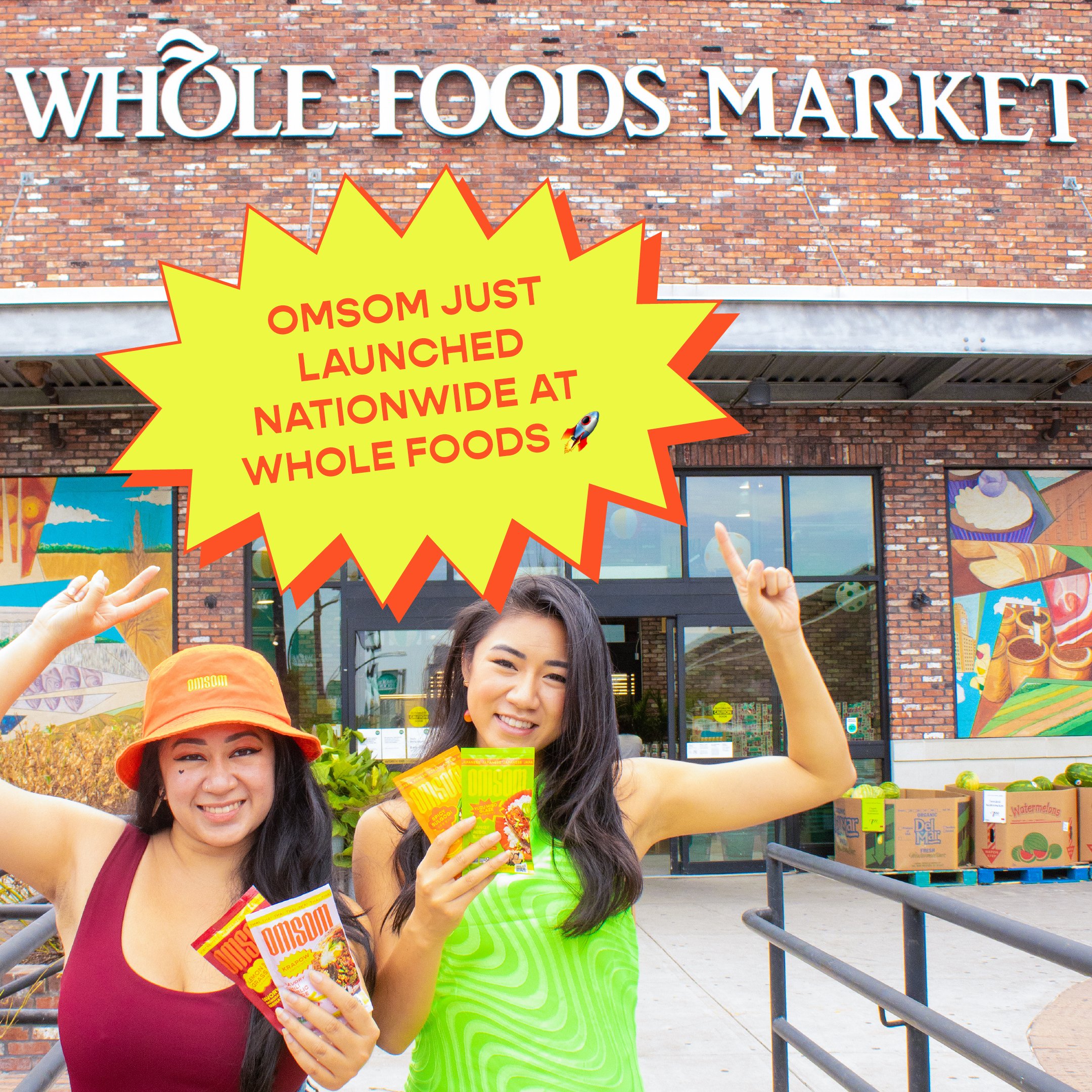
As you think about Omsom where it's at today, what are you focusing your energy on in this next season?
We got the zero to one part of our journey down and I'm really so proud of who we've been and how we have shown up in that zero to one, but zero to one is very much defined by scrappy community brand building, it's capturing this lightning in a bottle. And I think miraculously, Omsom has managed to do that. When I think about this next season, it's like one to ten, and that's really scary to me.
Honestly, I've never worked for a company larger than 20 people. I'm definitely a startup girl and now we're starting to grow up a little bit, right? Our team is getting bigger, we're taking on more investors, we're expanding into new distribution channels. It's like
I have to grow up in many ways. Also as a founder, I'm learning how to manage for the first time. I've never managed before. There's a lot of newness and learning that I'm going to have to do. And not just me as an individual, but also the company again, like what we've been so good at so far is this super, heart-forward cultural storytelling.
What does that look like when someone has 10 seconds to understand what we are on a Target store shelf? Jow do we capture some of that Omsom magic and "scale" it? I think that's the next season, is figuring out, how do we never ever lose our heart and our soul and all the things that people love us for while also growing up as a business and becoming more savvy about distribution and becoming more savvy about fundraising and becoming more savvy about team management and growing it? It's definitely a scary challenge, I'm not gonna lie. Sometimes I'm like, are Vanessa and I the ones to do this, but I think we are and if we're not that's okay. We're just trying our best and that's all that matters.
You can find Omsom at @weareomsom and omsom.com. Follow Kim @kimoftheinternet on all platforms or at her website: kimoftheinternet.com
